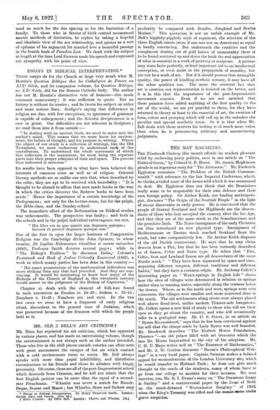MR. CLA 3 BELL'S ART CRITICISM.t
MR. BELL has reprinted his art criticism, which has appeared in various places, and'has made an entertaining volume, though the entertainment is not always such as the author intended. Those who live in the chill places outside coteries can often note with great amusement the escapes of hot air which contact with a• cold environment turns to water. Mr. Bell always speaks with more than papal infallibility, and' distributes canonizations to his friends and those he admires with kingly generosity. Of course, these are all of the post-Impressionist school which descends from Cezanne, and he will not admit that the best English painter can be more than the equal of a second- rate Frenchman. " Whistler was never a match for Renoir, Degas, Seurat and Manet ; but 'Whistler, Steer and Sickert- may Essays in Biblical Interpretation. By Henry Preserved Smith. London: George Allen and Unwin. [10s. 6d.] t Eines cizanne. By Clive Bell. London : Ghetto and Windus. [7141 profitably be compared with Bondin, Jongkind and Bertha Morisot." This quotation is not an unfair example of Mr. Bell's higgledy-piggledy style of argument, the selection of the three English names (even if one was not an American) as equal is hardly convincing. But underneath the crudities and the complacent dealing out of gold haloes of immortality there is to be found scattered up and down the book the real appreciation of what is essential in a work of painting or sculpture. A picture may state facts perfectly, or lend important aid to an intellectual conception, or even assist in the propaganda of morality, but yet not be a work of art. But if it should possess that intangible quality, the power of kindling aesthetic ecstasy, it may have alt the other qualities too. The more the essential fact that art is creation not representation is insisted on the better, and it is in this that the importance of the post-Impressionist movement consists. Even if we are not satisfied that these painters have added anything of the first quality to the art of the world, we are yet grateful to them, for they have returned in theory at least to the essential of art, the creation of form, colour and grouping which will call up in the onlooker the peculiar and special aesthetic sense. So it is that when Mr. Bell deals with these matters his- writing is of much more value than when ho is pronouncing arbitrary and unconvincing judgments.


































 Previous page
Previous page